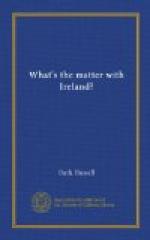But James Connolly’s fellow socialists in Ireland understand “why he was there,” They back his participation in the national war. And they know every Irishman will. So they go to the workers and say: “Jim Connolly died to make Ireland free.” Then while the workers cheer, they swiftly show why Connolly advocated the class war, too: “Jim Connolly lived to make Ireland free. He believed that the world is for the man who works in it, but in Ireland he saw seven-eighths of the people in the working class, and he knew that to these people life means crowded one-room homes, endless Fridays, no schools or virtually none, and churches where resignation is preached to them. So his life was a dangerous fight to organize workers that they might become strong enough to take what is theirs.” At Liberty Hall, one is told that the martyr’s name is magnetizing the masses into the Irish Labor party. And, in order to propagate his ideas, the people are contributing their coppers towards a fund for the permanent establishment of the James Connolly Labor College.
So labor fights for a republic first. At the last general elections it withdrew all its labor party candidates that the Sinn Fein candidates might have a clear field to demonstrate to the world how unified is Irish sentiment in favor of a republic. And at the International Labor and Socialist conference held in Berne in 1919, Cathal O’Shannon, the bright young labor leader who goes about with his small frame swallowed up in an overcoat too big for him, made this declaration:
“Irish labor reaffirms its declaration in favor of free and absolute self-determination of each and every people, the Irish included, in choosing the sovereignty and form of government under which it shall live. It rejoices that this self-determination has now been assured to the Jugo-Slavs, Czecho-Slovaks, Alsatians and Lorrainers, as well as to the Finns, Poles, Ukrainians, and now to the Arabs. This is not enough and it is not impartial. To be one and the other, this principle must also be applied in the same sense and under the same conditions to the peoples of Ireland, India, Egypt, and to such other people as have not yet secured the exercise of the inherent right.... Irish labor claims no more and no less for Ireland than for the others.”
After the republic, a workers’ republic? After Sinn Fein, the Labor party? Madame Markewicz is high in the councils of both Sinn Fein and Labor. One day, lost in one of her trance-like meditations in which she states her intuitions with absolute disregard of expediency, she said to me:
“Labor will swamp Sinn Fein.”
[Footnote 1. Figures supplied by William O’Brien, secretary Irish Labor party and Trade Union congress, 1919.]
[Footnote 2. Census of 1911.]
[Footnote 3. Figures supplied by Department of Agriculture of Ireland, 1919.]
[Footnote 4. Figures read by Thomas Lough, M.P., in House of Commons, May 14, 1918.]




